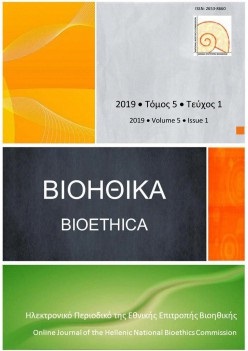Ευθανασία: Πρακτικές που εφαρμόζουν οι χώρες της Ευρωπαϊκής Ένωσης
Résumé
Η Ευθανασία αποτελεί ένα από τα θέματα που πραγματεύεται η βιοηθική και μάλιστα αρκετά επίκαιρο. Στην Ελλάδα, αλλά και στις περισσότερες χώρες της Ευρωπαϊκής Ένωσης το θέμα της ευθανασίας δεν έχει τύχει εξειδικευμένης νομοθετικής ρύθμισης, παρά μόνο συζητείται κατά καιρούς δημιουργώντας εντάσεις και διχασμούς. Από τη μια πλευρά κάθε άνθρωπος έχει το δικαίωμα της αυτονομίας, επομένως οι αποφάσεις στο τέλος της ζωής θα πρέπει να χαρακτηρίζονται από την ελευθερία του ατόμου για αυτοδιάθεση. Από την άλλη πλευρά η ζωή θεωρείται ως ύψιστη αξία και το καθήκον του υγειονομικού προσωπικού είναι να τη διαφυλάττει με κάθε μέσο, χρησιμοποιώντας την επιστημονική του κατάρτιση.
Στο παρόν πόνημα πραγματοποιείται μια σύντομη αναφορά στις πρακτικές που χρησιμοποιούν οι χώρες της Ευρωπαϊκής Ένωσης, όσον αφορά τις αποφάσεις στο τέλος της ζωής. Οι περισσότερες χώρες τάσσονται κατά της ευθανασίας, ενώ αναγνωρίζουν το δικαίωμα στην άρνηση της θεραπείας από τον ασθενή. Μόνο τρείς χώρες έχουν προχωρήσει σε νομιμοποίηση της ευθανασίας, υπό αυστηρούς όρους. Οι υπόλοιπες, λόγω της ευαισθησίας του θέματος, δεν προχώρησαν σε νομοθέτηση. Διαφαίνεται περίτρανα ότι η κοινωνία δε διαθέτει τις απαραίτητες διασφαλίσεις ουτοσώστε να μπορέσει να πλαισιώσει ένα τέτοιο ζήτημα προφυλάσσοντας την αληθινή βούληση του ατόμου.
Article Details
- Comment citer
-
Κοζαμάνη (Alexandra Kozamani) Α. (2019). Ευθανασία: Πρακτικές που εφαρμόζουν οι χώρες της Ευρωπαϊκής Ένωσης. Bioethica, 5(1), 89–100. https://doi.org/10.12681/bioeth.20837
- Rubrique
- Reviews

Ce travail est disponible sous la licence Creative Commons Attribution 4.0 International .
Authors who publish with this journal agree to the following terms:
- Authors retain copyright and grant the journal right of first publication with the work simultaneously licensed under a Creative Commons Attribution CC BY 4.0 License, which allows for immediate free access to the work and permits any user to read, download, copy, distribute, print, search, or link to the full texts of articles, crawl them for indexing, pass them as data to software, or use them for any other lawful purpose. Appropriate credit must be given by citing the author(s) and the original publication in this journal.
- Authors are able to enter into separate, additional contractual arrangements for the non-exclusive distribution of the journal's published version of the work (e.g. post it to an institutional repository or publish it in a book), with an acknowledgement of its initial publication in this journal.
We encourage authors to deposit their articles, as well as data underlying the publications, in institutional and/or other appropriate subject repositories.
Bioethica permits and encourages authors to archive the final publication pdf in institutional (e.g. the repository of the National Hellenic Research Foundation) or other appropriate subject repositories (e.g. SSOAR repository for social sciences), in compliance with institutional and/or funder open access policies, after publication in the BIOETHICA. Authors must provide bibliographic details that credit publication in the journal, as well as related funding details (when applicable).
Lists of institutional and other subject-based academic open access repositories can be found listed by country at the registry http://opendoar.org/countrylist.php
If your institution does not possess a repository you may deposit a copy of your paper at no cost with www.zenodo.org , the repository supported for open access research in the EU by the European Commission, through the project OpenAIRE (www.openaire.eu )



